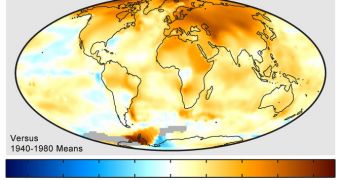Though the negotiations of the 2009 UN Climate Summit were scheduled to conclude yesterday, representatives from nearly all countries involved decided to give compromise another chance today, in an extended session. Things don't appear to be running too smoothly however, as a draft proposal presented earlier was rejected by some developing countries. Their decision brings down the odds of a successor to the Kyoto Protocol being signed considerably, analysts say, quoted by the BBC News.
The draft set forward today was developed by a group of countries led by the United States, which also included China. US President Barack Obama called the draft a “meaningful agreement”, but the proposal was met with skepticism by officials from a few developing nations, who said that the actions stipulated under the new document were too mellow to allow for any real effect on climate change. The measures, they added, were not enough to halt global warming, and the devastating effects it has on the environment, especially for island nations and those in desert areas.
The thing about the climate summit is that all decisions taken at the meetings need to be endorsed by all 193 participating countries. The main reason why the draft proposal was rejected is the fact that the need to keep global warming temperature increase lower than 2 degrees Celsius was not acknowledged as a formal target. Rather, the document – which was elaborated by the US, China, Brazil, South Africa and India – only held that it acknowledges the view that temperature rise should be kept under this level. No clear, legally-binding methods of sticking to this goal were set forth.
“In my mind, this document is amicable. Of course it is not what we were looking for, and I will be the first person to be unsatisfied; but this document allows us to continue negotiations and to have a procedure leading to a binding legal agreement within 2010. I urge all countries to back this, and do not let these talks collapse,” said Maldives President Mohammed Nasheed. The main opposition to the agreement now comes from the ALBA bloc, which includes countries such as Nicaragua, Venezuela, Cuba, Ecuador and Bolivia.
“I will not hide my disappointment regarding the non-binding nature of the agreement here. In that respect the [new] document falls far short of our expectations,” added Jose Manuel Barroso, the President of the EU Commission. He added that European nations would back the deal regardless, even with all its flaws. “The text we have is not perfect. If we had no deal, that would mean that two countries as important as India and China would be freed from any type of contract. The United States, which is not in Kyoto, would be free of any type of contract. That's why a contract is absolutely vital,” said French President Nicolas Sarkozy.
“The city of Copenhagen is a crime scene tonight, with the guilty men and women fleeing to the airport. There are no targets for carbon cuts and no agreement on a legally binding treaty. It is now evident that beating global warming will require a radically different model of politics than the one on display here in Copenhagen,” said the executive director of Greenpeace UK, John Sauven. A large number of world leaders have already left the talks, including Obama and the Brazilian President, Luiz Inacio Lula da Silva.

 14 DAY TRIAL //
14 DAY TRIAL //